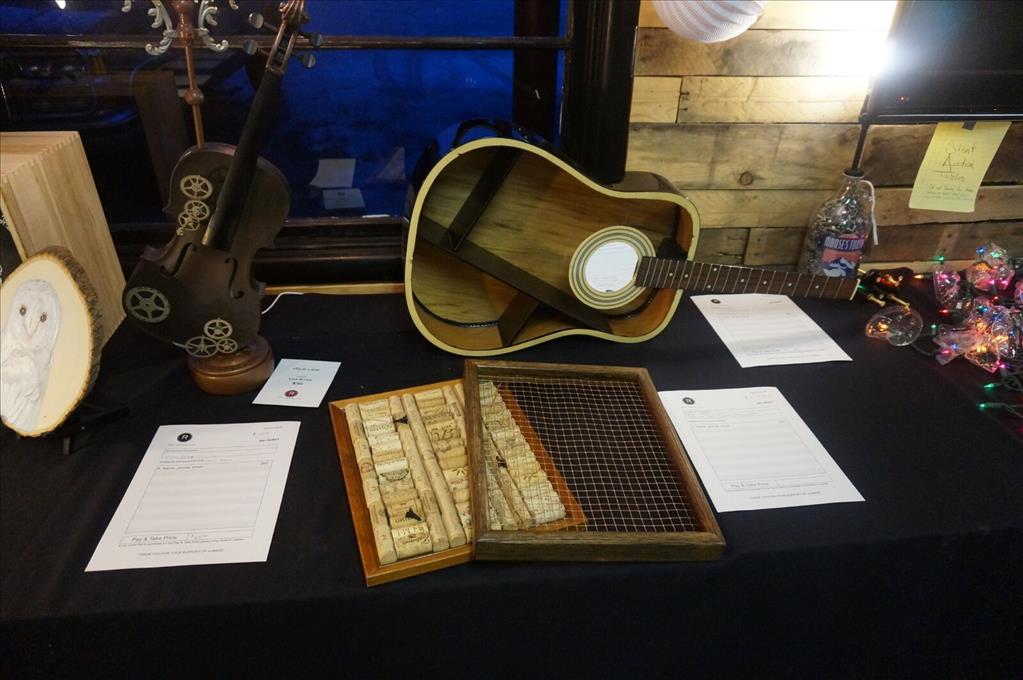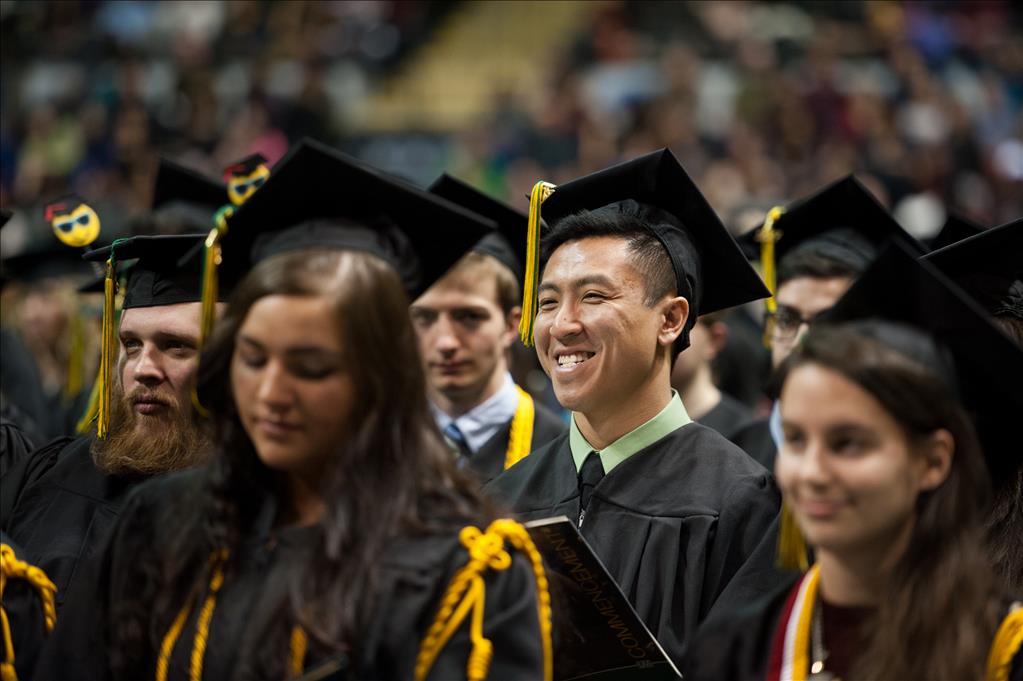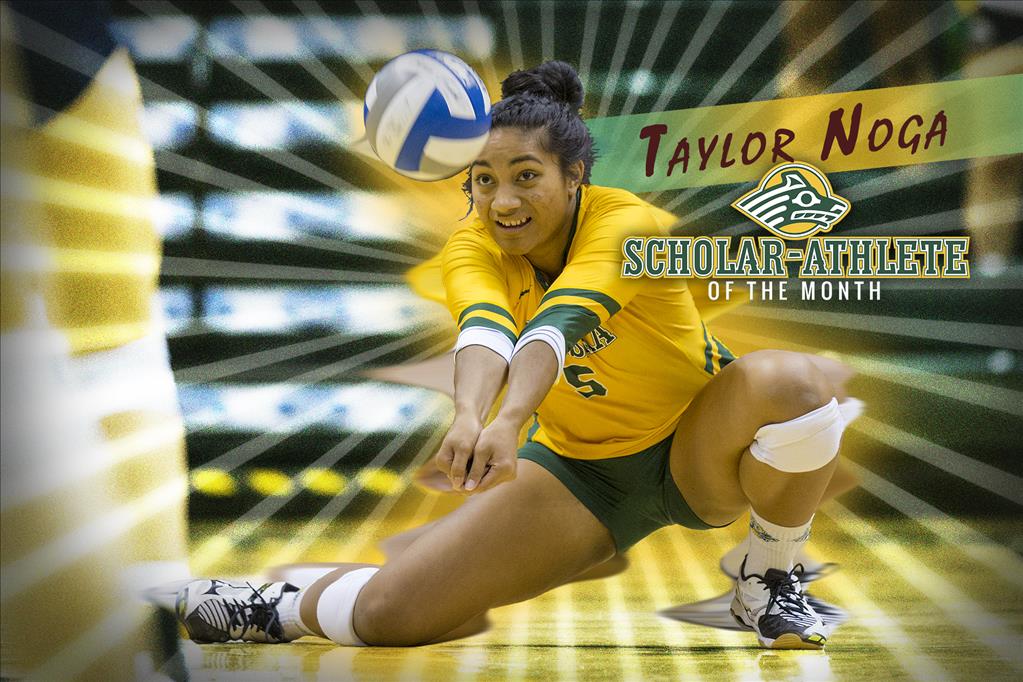Who reads the Watchmen?
by joey |
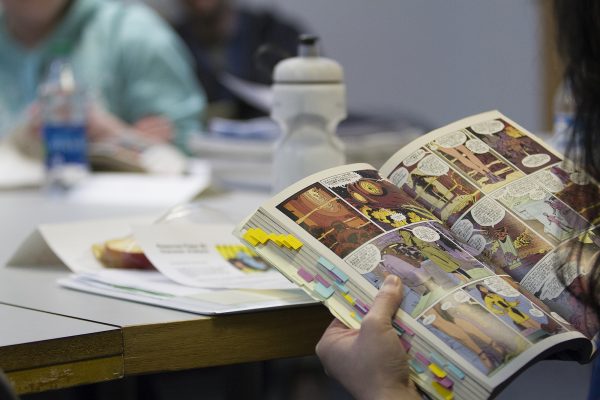
A student reads Watchmen in an Honors College class based on the graphic novel. (Photo by Philip Hall / University of Alaska Anchorage)
Despite today's summer blockbusters, comic book characters haven't always been mainstream. In the 1980s, comics were viewed as easily overlooked, cheaply produced and uninspired - the literary equivalent of kid's cereal.
But then came Watchmen, a 1986 debut from DC Comics, written by Alan Moore. This was no Riverdale malt shop, à la Archie. This was a dark redirect into revisionist American history, populated by a sociopathic, arrogant and all-around flawed cast of characters. A BBC review of the series dubs Watchmen "the moment comic books grew up."
The book influenced comic design (Watchmen pioneered the nine-panels-to-a-page design) and storytelling (nearly every Hollywood hero now has a troubled past or present hang-up) and overall elevated the graphic novel's status. In a strong vote of legitimacy, Time named Watchmen to its list of 100 best English-language novels in 2005.
Who watches the watchmen? That question, posed by Roman poet Juvenal, lends the work its title. But who reads the Watchmen? Students in UAA's Honors College, among millions more.
Comics in the Honors College
UAA's Watchmen class is part of the Honors College, where first-year students enroll in a hyper-focused humanities course (other semester-long spotlights include writers like Plato or Jane Austen, and works as varied as Grapes of Wrath to the 1971 ANCSA legislation).
"This is really one of the rare opportunities for faculty to teach these unique courses," noted John Mouracade, dean of the college.
Like all Honors courses, students meet seminar-style around a table, and classes are capped at 16 students. The Honors College is designed along a four-year track - humanities the first year, social science research the second, community service the third, mentored thesis the fourth - but classes are open to all students, with instructor permission.
English professor Jennifer Stone teaches this semester's Watchmen course, which began with general comics comprehension and will end with scholarly critiques of the story. In between, her students pore over their dog-eared and Post-it-stamped copies of the 12-volume series, each following a main character to focus their reading of the sprawling novel.

English professor Jennifer Stone teaches a course based upon the graphic novel Watchmen to a group of students in the UAA Honors College. (Photo by Philip Hall / University of Alaska Anchorage)
The text is based in an alternate U.S. history where Watergate never happened and government cover-ups bleed into the Cold War 1980s. Though 30 years old, the text still resonates today (especially with Russia's influence returning to American headlines).
"It's such a complex text," Stone said, describing the layers of background needed to comprehend the story. For one, action and plot move visually in comics, and readers are often expected to fill in gaps between panels. Then there's the Reagan-Thatcher history that shaped the book, years before these students were even born.
"It's envisioning an alternate history, but it's overlaid with real history, so you have to understand the historical context," she said.
The plot, too, is a doozy, jumping through space and time, with coincidences and callbacks - both visual and textual - popping up across timelines. Certain scenes have a soundtrack, indicated by an asterisk. To really complicate matters, the book also has texts within the text (occasionally, the nine-panel framework disappears in lieu of illustrated police reports, academic journals, newspaper clippings, a badly written exposé book... even another comic book read by one of the characters).
"One thing I love about this graphic novel in particular is just the level of experimentation," Stone noted. "It mixed several different genres in to the graphic novel format."
"It's been really fun to sit down with a group of smart young people and think through the text together."
Comics for homework
Each class, Stone guides the conversation as students bring their own unique takes to the roundtable course.
English/philosophy major Ben Kraft had read the book before, and signed up as soon as he heard it was offered. "It's a straight-up fun class," Kraft said. "Dr. Stone is awesome because she's taking this without the idea that being a comic book is some kind of crutch or caveat."
Though he's a fan of the book, he's most enjoyed the course format. "She's really able to engage with us," he said. "That's honestly my favorite part of the class ... having time to really cut down our writing and have us see where problems are."
The small class size also lends itself to course discussion. "The roundtable format is exactly what this sort of class needs," said Ashley Wilmer, a biological sciences major in the Honors College. "When discussing the book, I find it refreshing to hear other people's perspectives. Everyone is great at articulating their arguments and we play off of each other to find more meaning in the text."
Wilmer hadn't read the book before, but grew up flipping through comics at Bosco's with her dad. She described her basic understanding of Watchmen before the class as "a group of antiheroes and one of them was a floating, blue, naked guy" (she's not wrong.) Now past the midway point, she says the course "has elevated my view of comics and has really shown me just how important they are as an art medium."
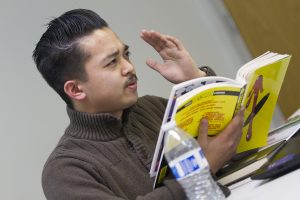
Amiel Pineda discusses the graphic novel Watchmen during class. (Photo by Philip Hall / University of Alaska Anchorage)
That's only one goal of the course, says Stone. "The big focus of the class is developing their skills as readers and writers, being able to practice close reading with a robust, difficult text. I want them to leave with an appreciation for this text, but also understanding how this text is cultural and still relevant even today."
And, at the end of the day, comics in the classroom is just fun.
"Many of my classes here at UAA are science-based lectures and non-interactive," said Wilmer, one of several biology students in the class. "This is a welcome experience. I look forward to coming to class every week, and reading a graphic novel as a homework assignment beats studying for my other courses any day."
 "Who reads the Watchmen?" is licensed under a Creative Commons Attribution-NonCommercial 4.0 International License.
"Who reads the Watchmen?" is licensed under a Creative Commons Attribution-NonCommercial 4.0 International License.











